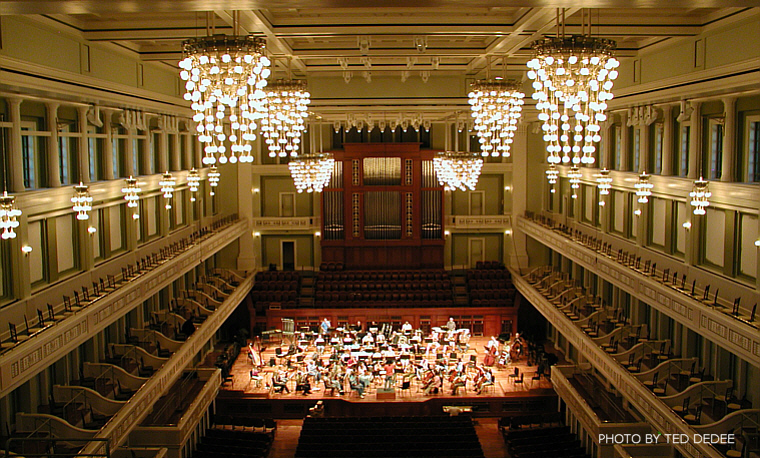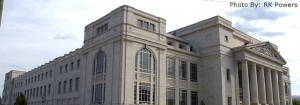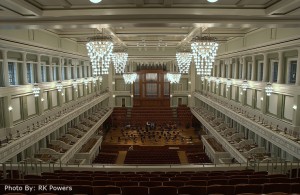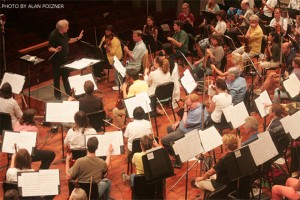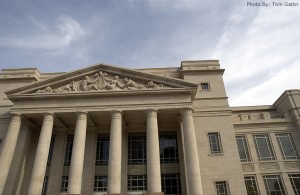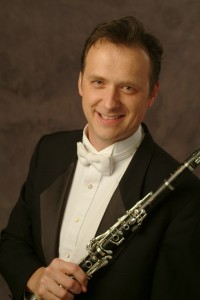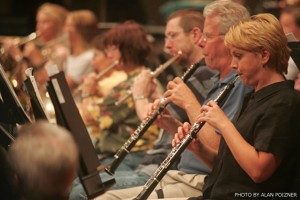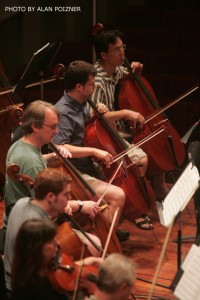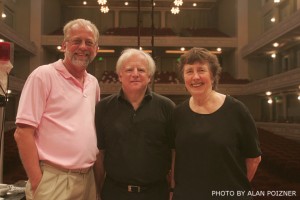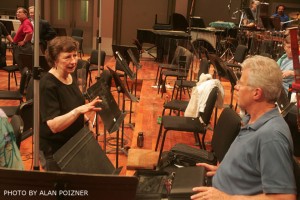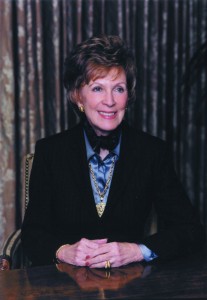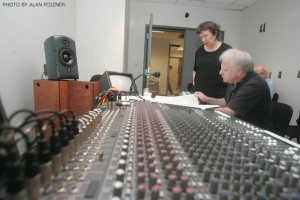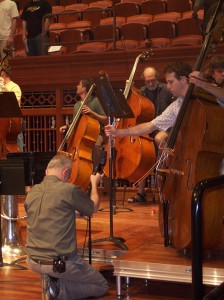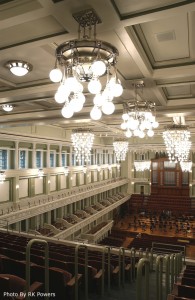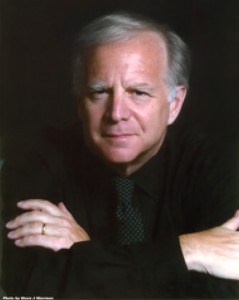Nashville Symphony Orchestra
About The Ensemble
An Orchestral Cinderella Story
Did you hear? They’re building a $120 million symphonic concert hall in Nashville. You read that correctly; it’s not a typo – Nashville, Tennessee. Even more, the Nashville Symphony Orchestra Association owns and operates the 197,000-square-foot neo-classically inspired Symphony Center that maintains the goal of transforming Nashville’s musical landscape and becoming the cultural heart of the city’s downtown area.
Designed by architect David M. Schwarz, acoustician Paul Scarbrough, and Fisher Dachs Associates, the Schermerhorn Symphony Center is designed to be one of the most acoustically advanced concert halls in the world. In addition to the 1,870-seat Laura Turner Concert Hall, the center will contain a 3,000 square-foot education center, the organization’s administrative offices, numerous musician facilities, and a full commercial kitchen. Another highlight of the new building is a garden and cafe, enclosed by a colonnade which is connected to the west side of the building. The garden will be open to the public throughout the day and during concerts.
Months before the planned opening, patrons could take a tour of the Laura Turner Concert Hall via a virtual movie. The narrated virtual movie lasts several minutes and whisks you through every level of seating the hall has to offer, including the cabaret style seating offered on pops and special events concerts. This is the first time patrons have been able to take advantage of such advanced technology to take an in-depth look into a new concert hall before its scheduled opening.
An earnest Cinderella story, the Nashville Symphony filed for bankruptcy in 1988 and wasn’t released from that state until seven years later in 1995. Shortly after emerging from bankruptcy, the organization hired Alan Valentine as their President and CEO. Upon his arrival, the orchestra embarked on the first step toward stability and normalization by instituting a $10 million endowment campaign that actually raised $25.5 million.
Within eight months of concluding the institution’s largest capital campaign project to date, the Nashville Symphony board of directors did the last thing most people in this business would expect them to do. They approved another capital campaign five times larger than the one they just completed. A few months later, in August of 2001, the organization formally launched the $120 million “A Time for Greatness” campaign, designed to raise funds for all related aspects to the new symphony center. That campaign has been a success and their hall officially opens on September 9th, 2006.
In the short space of a decade following bankruptcy, the organization has moved from being a “ward of the state” to building a $120 million symphony center. Never before in the history of professional American orchestras has an organization moved so aggressively or raised that much money in such a short period of time.
Ten years ago there were 73 musicians in the Nashville Symphony and only 56 were employed full-time, earning a base salary of $21,441; that was the same year the organization launched its $23.5 million endowment campaign. Since that time, the number of full-time players has grown to 82 and the base salary has increased to a minimum base salary of $42,183 for the 2006-2007 concert season, a 96% increase. Additionally, the 2006-2007 season expands Nashville’s season by one week and 44 additional services to accommodate an additional performance per concert series.
On April 18th, 2005, the organization unexpectedly lost long-time music director and the new symphony center’s namesake, Kenneth Schermerhorn. On August 23, 2006, the Nashville Symphony announced that conductor Leonard Slatkin will serve a three-year appointment as Music Advisor while the organization searches for a new music director.
Of course, the Nashville Symphony wouldn’t have been able to realize such a grand unified vision without a group of organized musicians working in conjunction with dedicated board leadership and capable managers. As such, we’ll hear from representatives of each of those stakeholders to learn more about how this organization is writing its own Cinderella story.
September 2006
An Interview with Dan Lochrie, Nashville Symphony Orchestra Committee Co-Chair
Bass Clarinetist Daniel Lochrie has been a member of the Nashville Symphony since 1992; he also teaches at Belmont and Lipscomb universities and served as assistant professor of clarinet at Middle Tennessee State University for two years. He currently serves as the elected orchestra committee co-chair along with his colleague, cellist Brad Mansell.
Polyphonic.org Senior Editor & Research Principal, Drew McManus, spoke with Dan over the telephone about how the musicians are playing an increased role in shaping the organization’s artistic future.
Drew McManus: What sort of artistic impact has the new hall had on the players?
Dan Lochrie: For me, if I had something with the cellos in the old hall I couldn’t hear them at all on the stage. With regard to articulation, the old hall was so muffled, that the audience couldn’t really hear details. It may sound vulgar, but I’ve always thought our playing in the old hall was industrial, needing lots of volume, effort, and large gestures, since the intimate aspects of music were not so successful. However, the new hall does a much better job of allowing the players to hear each other and that, right off the bat, will change how we play for the better because we’ll be able to match each other and the audience will hear everything we do. In many ways, it will force us to play differently, improve, and really show what we’re capable of doing.
We had the Indianapolis Symphony music director, Mario Venzago, come in to help with fine tuning the hall’s acoustics and help us as an ensemble adjust to the stage. It’s exciting to be able to work on so much detail and having the end result come across clearly. It’s also an exciting challenge to have so many different conductors coming in this year as we conduct the music director search, so we’ll need to be a much more flexible ensemble than we had to be in the past.
Drew McManus: Have the players had an opportunity to hear what the ensemble sounds like out in the hall as well as on stage?
Dan Lochrie: We did have players go out into the hall during rehearsals so we could all hear things from both perspectives. We even sat in the choir loft seats behind the ensemble, and since the management plans to sell those seats when they aren’t in use by the chorus it was very helpful to have so many listening perspectives. Personally, I think having the seats behind the ensemble open to the patrons is a great new option, adding significant visual interest.
What’s nice about this hall, regardless of where patrons sit, is they will have a much more consistent and better overall listening experience compared to the old hall. They will simply be able to hear far more detail and breadth of dynamics than was possible before. Hopefully, having such an improved listening experience will allow us to give performances with bigger, better impact.
I think all of those things will keep people coming back regularly, and since we added a performance to each concert series that means we’ll have to attract an additional 1,000 patrons per concert series as compared to the old hall. As such, that improved listening experience is necessary to keep them coming back.
As for the backstage facilities there are still things that need to be completed with regard to construction, but our management has done a great job at making sure the facilities are comfortable and what we need. I’m looking forward to seeing what they are like once they are completed.
will simply be able to hear far more detail and breadth of dynamics than was possible before.””]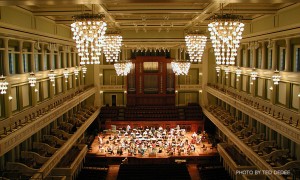 Drew McManus:What role have the players had in artistic direction?
Drew McManus:What role have the players had in artistic direction?
Dan Lochrie: After Kenneth Schermerhorn, our former music director, passed away we knew there would be some tricky issues to contend with such as an unexpected musician death, unresolved tenure issues, etc. Since we don’t know when we’ll hire a new music director we have worked hard to tackle these issues between the orchestra committee, principal players, the artistic planning committee, and management. So far I think we’ve done a good job, we even hired two permanent players instead of taking the easy way out and simply hiring long term substitutes. We decided it would be unfair to bring people in without being able to tell them with certainty what the working situation will be like with regard to a permanent position. I think that demonstrates we’re not simply looking for band-aid solutions and we’re willing to put the time and effort into making things as positive and constructive as possible.
At the same time, management sincerely approaches the orchestra committee and principal players to get our input on these issues. The difficulty is that the committee traditionally serves a role to implement the contract, serve the players, and act as an intermediary with management; but that’s a design which assumes there’s a music director in place. As such, we’ve had to expand our duties and responsibilities to appropriately deal with these tricky issues during this unexpected period, as have our principal players and artistic planning committee.
Drew McManus:Where do you see the organization moving in the next 10 years?
Dan Lochrie: I’ve been here for 13 years and I think the scary part is that we’re expanding our number of series offerings annually, and we’re increasing the number of performances per week; we need to make sure the community can sustain that growth. I don’t think things will go badly at all because I think we’re up to the challenge and the community wants what we have to offer, but moving into a period of rapid growth is always reason for positive tension. As long as we’re successful and maintain our momentum, we’ll have a fabulous future: better pay, recordings, increased exposure, etc. We’ve done it the right way leading up to this point so as long as we keep it up and stay involved, I think we’ll be in great shape.
Another recent change is that we are coming out of a very long collective bargaining agreement that we put in place to accommodate all of this rapid growth. Looking back on the decision, I think creating such a long contract ended up being a good thing and as long as we keep doing our part by playing well, we’ll have a really bright future. I think we’re really starting to get on the artistic radar screen in this business, and if we keep moving in the direction we have, hopefully we will earn the artistic notice and respect of those who already admire what the organization is doing. Acquiring Leonard Slatkin as our new Music Advisor for the next three years will definitely help. As far as tweaking acoustics, planning repertoire, product vision and strategy, hiring, etc., his presence will be very advantageous. His reputation and stature in the industry won’t hurt either!
An Interview with Alan Valentine, Nashville Symphony Orchestra President & CEO
Serving as President & CEO sine June, 1998 Alan Valentine has presided over an unprecedented period of growth at The Nashville Symphony. Polyphonic.org Senior Editor & Research Principal, Drew McManus, spoke with Alan over the telephone about how the organization accomplished this growth in such a short period of time and where they plan to go from here.
Drew McManus: How do you see the Nashville Symphony within the current environment of the American orchestral scene?
Alan Valentine: I see the Nashville Symphony as the rising star with respect to pulling ourselves up into the next tier. I’ve always felt like we’ve had the potential to do this since I arrived here. With the new hall, our now much larger endowment, and our recent appointment of Leonard Slatkin as Music Advisor, I believe that goal is more within our reach than ever. And I am really excited about Leonard’s appointment – he came down in June to conduct our “Hard Hat” concert for all of the construction workers and to record a CD of the music of Joan Tower with the orchestra, and we had a fantastic time together.
He had a palpable chemistry with the orchestra, and it was clear to me that he and I would work together extremely well. We have already built a reputation as one of the country’s leading interpreters of American music – through our recordings for the Naxos American Classics Series – and Leonard is one of the world’s leading advocates for American music, so the appointment seems natural. And, it will give us the time we need to do a really good job in completing our search for Kenneth Schermerhorn’s permanent replacement in the position of music director, so that we stay focused on who we are as an orchestra, and on what’s important in the qualities of our next music director.
Here in America we tend to measure things by numbers but in Europe you don’t ask that; instead, it’s all about how well you play. As such, we’ve always designed our goals based on that perspective and the numbers have followed.
Drew McManus: Where do you want to see the organization develop artistically and as an institution over the next five to ten years?
Alan Valentine: Definitely into the ranks of the major orchestras. To that end, after next year, we should move up to the ASOL Group 1 level. Artistically, I think we’ll continue to grow because of salary improvements similar to what we had over the last six years. Using that to attract better players at auditions along with the niche we’ve carved for ourselves with American music will help continue to propel our reputation forward.
One of the most important aspects of the new hall is that it will allow the players to hear each other better – and, of course, the audience will be able to hear just how good we are. Personally, I observed both of those points during an acoustical “tuning rehearsal” in the hall in June led by Indianapolis Symphony music director, Mario Venzago. At one point during that process, Mario turned to me and said “Alan, within a year, you’re not going to recognize this orchestra”.
I think the quality of the hall is so critical to how well an ensemble performs – it is their ultimate instrument. I used to have arguments with the former music critic of the alternative newsweekly here about the reason the orchestra sounded so much “better” when we played in Carnegie. In my view, it was because it’s such a good hall, and one in which the musicians could really hear each other. With the new hall we’re going to get that Carnegie sound here all the time here – especially in terms of ensemble among the players, and sheer sound energy for the audience. He never wanted to believe me but I know it’s going to happen starting this season.
Drew McManus: What role does the relationship between managers and musicians have in creating a healthy institutional environment?
Alan Valentine:I think it’s extremely important. I believe it’s a manger’s job to not only work with the board on musician issues but it’s their job to bring the two groups together and help both sides understand their respective points of view. Management should be pivotal to getting it all to work, and without that, the whole institution starts to falter and.
Drew McManus: What sort of qualities do you think board members need to possess in order to build a healthy organization and what is your role in developing board members?
Alan Valentine: I don’t have a vote on the governance committee but my participation in those committee meetings is crucial. I also think it’s crucial that the board chair and the executive director have a simpatico relationship, which means that more often than not, they share like views, and any disagreements are resolved in a compromise fashion where both individuals are happy with the results.
However, for my own participation in the nominating process, I like to look for board members who have a passion for the product. It helps, of course, if they have money and clout, but without the passion, all those other resources won’t necessarily bear fruit. That doesn’t mean everyone has the same level of passion coming into the organization; instead, the process is always growing and changing and I’ve seen board members become passionately involved after their exposure pulls them in. One of our board members doubled his already substantial contribution to the “A Time For Greatness Campaign” after going on a concert hall tour that helped him “get it” with regard to why we were building this new building. Finally, finding members who are willing to use their influence to raise money and advocate for the organization is important, even if it means it will cost them in board-level quid pro quo in the community, as they are often expected to personally repay to other causes, the favors they have called in on behalf of the orchestra.
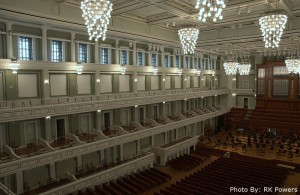
The Schermerhorn Symphony Center is one of the only venues in the U.S. that features natural light inside the concert hall
Drew McManus: What are the three most important aspects of an executive administrator’s job?
Alan Valentine:The executive director is one of the primary focal points, and the most important thing he or she can do is to build consensus. Creating a team of people who are galvanized around a unified vision is critical. They don’t necessarily have to create that vision, but they should help shape it and be able to rally support around it.
If you take a group of people and create a healthy internal culture, so that they all like each other or at least get along, and you then get them to become really passionate about, and believe in, the same vision, based in a shared sense of values, ideals and goals, those people won’t ever know what they can’t do. What you end up with is an organization that is much bigger than the sum of its parts and not so dependent on just one person. To me, I’ll know I’ve been completely successful here when it is clear that if I were to get run over by a bus tomorrow, things would be just fine.
It’s ironic, but the thing about good leadership is that the more you empower others, and marginalize your own role, the more vital you actually become to the institution. That’s something a lot of leaders don’t seem to understand. Instead, they feel threatened by empowering other people to do things and I think that’s a big mistake.
All in all, it has been a fantastic journey thus far – and it has only just begun. At the same time, I think it’s safe to say that we’ve certainly made our own mistakes, most of which we don’t fully understand as yet, but I know we’ll work them out because of the environment we’ve created here. However, I do want people to understand that although we’re successful, we’re not perfect.
Once you start getting the right people in place and creating a vision together it’s amazing what can happen. People always ask me “why Nashville?” and I always answer “why not Nashville?” It’s so easy for people to label this as a country music town or a pop music town that assume that we’ll never be able to make anything of the orchestra, which is ridiculous. I think most people who fail to realize big dreams, or overcome obstacles, do so because they doom themselves before they ever start. To that end, I think being from somewhere besides Nashville, or perhaps just my own plain naiveté, has helped me to resist getting pulled into any kind of self-defeating “why Nashville?” attitude – I love this City.
An Interview with Martha Ingram, Nashville Symphony Orchestra Board Chair
Martha Rivers Ingram, Chairman of the Board of Ingram Industries Inc., is well known for her support and contributions to the arts community. A past member of the advisory board for the Kennedy Center for the Performing Arts in Washington, DC, she chaired the Nashville Symphony board from 1988 to 1991 and is currently serving again as board chair as well as vice-chair of the campaign for Schermerhorn Symphony Center, the new home of the Nashville Symphony located in downtown Nashville.
Mrs. Ingram recently published Apollo’s Struggle: A Performing Arts Odyssey in the Athens of the South, Nashville, Tennessee, a history of the arts in Nashville, as well as a study of the past, present and future of the arts in the South.
Polyphonic.org Senior Editor & Research Principal, Drew McManus, spoke with Martha over the telephone about the qualities she believes are necessary to be an effective board member during one of the most difficult economic climates for cultural institutions in decades as well as where she would like to see the orchestra develop.
Drew McManus: How do you see the Nashville Symphony within the current environment of the American orchestral scene?
Martha Ingram: I think that we are striving to be the best orchestra we can be and I imagine the others are doing the same thing. This is a big step for us and I think we’re going to be able to hear and understand just how good the orchestra really is. We’ve heard it in Carnegie and we know what it can do and even though the previous facility was good it wasn’t as good for a symphony orchestra at the [artistic] level that we’ve built.
Drew McManus: How do you want to see the organization develop artistically and as an institution?
Martha Ingram: I see us striving higher artistically, and of course the appointment of Leonard Slatkin as Music Advisor will bring the orchestra to a whole new level. We certainly love hearing that we’re moving up in certain industry rankings, but we want to serve the public around us as best as possible. So far, I think we’re doing a good job at that by selling more tickets than ever, especially this year because of the new building of course.
We’ve also made considerable strides in reaching out to a younger audience. We even have a local bank, AmSouth Bank, that subsidizes tickets for high school students to attend concerts on sharply discounted ticket prices. For me, I would like to see these accomplishments continue.
Drew McManus: Now that the Schermerhorn Center is opening, do you plan to stay with the organization as a board officer to help guide its development?
Martha Ingram: I’ll be chair for one more year and my successor is already selected, after that I hope to see many young professionals join the board and become active members. This will give some of us that have been working in board positions for many years a chance to still be involved but in a different capacity.
I’m really looking forward to getting this fresh blood in and seeing what these young people can do. I feel really good about because I think we’ve selected new board members very well and they’re very excited about taking over [the outgoing member’s seats].
Drew McManus: Do you have any official mentorship program for younger board members?
Martha Ingram: Informally, yes but all of our new members are quick studies so I don’t worry much about that. I will say that many of these younger board members are also our larger donors; many are founding members of the new hall – meaning they gave at least $1 million donors.
Drew McManus: What sort of qualities do you think board leaders need to possess in order successfully engage a capital campaign level project?
Martha Ingram: They need to have a passion for the organization and focus; with that, they can sell it to others. And that’s what it’s about: selling and raising money. They don’t need to know how to program and hire musicians, we have professionals to do that, but they have to know how to obtain contributions and engage patrons.
Drew McManus: Do you think personal risk is a factor in becoming a successful board leader?
Martha Ingram: That’s an interesting question. It has never occurred to me that risk or failure is something to worry about. If the organization is running properly, one person will step up to grab the reigns if another person fails. We do work in teams and even though there are leaders they prop themselves up with the team members. Maybe it’s an advantage to live in a smaller community like Nashville since everyone knows each other to some degree. I also think that contributes to increased feelings of being connected and wanting to participate since it will benefit you, your family, and your friends. In the end, it gets to be a very personal thing.
Drew McManus: What role does the relationship between board members and musicians have in creating a healthy institutional environment?
Martha Ingram: That’s a pretty interesting question actually. I think one of the things that has made us so successful, and to hopefully sustain our success, is we have 10 musicians that are full board members. They are on every committee and are involved in everything we do and every decision we make.
I don’t know if this is common elsewhere but it’s only a fairly recent thing here and has only come about since I became board chair. That was a difficult time then but in order to make things better we asked the musicians to become board members.
As a result, I think the relationship between our board and musicians is very good and it’s very helpful to hear what the musicians have to say. So much of how the symphony center has developed is due to musician input – right down to how many bathrooms to build and how to design practice facilities.
We even have musicians on the executive committee so they see all the hard numbers the rest of us do. We aren’t afraid of giving that information out in fear of them using it against us in negotiations, instead, we want them to know everything and contribute to what we do.
I also want to point out that [Nashville Symphony President & CEO] Alan Valentine’s leadership has had capacity beyond what any of us imagined and has done a splendid job getting this building project completed. I think another reason we have such a good relationship with the players is due to Alan’s leadership.
An Interview with Leonard Slatkin, Nashville Symphony Orchestra Music Advisor
Shortly before the Schermerhorn Symphony Center was completed, its namesake, Kenneth Schermerhorn, unexpectedly passed away. Kenneth planned on serving as the Nashville Symphony’s music director for the first few years after the hall opened and at that point, the organization would begin searching for his replacement.
Given the unexpected turn of events, the ensemble found itself in a position where it was lacking artistic leadership at a point in time when it needed it the most. Fortunately, they were able to capitalize on a working relationship with conductor Leonard Slatkin and grow that into a three year artistic partnership.
While attending the gala opening events, Polyphonic.org Senior Editor & Research Principal, Drew McManus, caught up with Leonard to talk about his new responsibilities with the organization.
Drew McManus: You recently accepted the position of Music Advisor for the Nashville Symphony orchestra. Could you describe how the position came about and why you decided to accept the position?
Leonard Slatkin: My contract term is for three years although that might change if they decide on a music director. I was asked to do the opening of the hall after Kenneth Schermerhorn passed away and I thought coming help out a colleague that would be a good thing to do.
All the sudden the opportunity to make a recording in the new hall of Joan Tower’s music came up in July. Even though I had not worked with the Nashville musicians for a very long time we had a great time with very difficult repertoire.
Afterward, I sat down with management to find some free dates where I could come in and conduct a few concerts. A month later they approached me to take on an official role during this period and after working things out with my calendar and determining that my duties, we came to an agreement.
This orchestra’s commitment to American music was important to me. Having an American program on every classical concert is something I thought I would be well suited to help them with and it was an important factor in accepting the position.
Drew McManus: where do you see this orchestra moving artistically now that they are in the new hall?
Leonard Slatkin: They need to move forward and they will. I think this orchestra is poised to move to the next level, wherever that may be, and the new hall is a wonderful starting point to build from.
Drew McManus: How will your role as Music Advisor fit into that progress?
Leonard Slatkin: I’ll be able to help them most with programming. I’ll also offer advice with hiring a new music director and in auditions with what the music director used to do. Somebody has to say “this is the sound the orchestra needs to have” and I’ve done this for 30 years.
I’m working with the players in this respect with judging the ability of the new hall. What sort of sound it can generate and what it can’t. Their old hall was harsh and unflattering but here the strings don’t have to worry about using too much bow and the brass have to learn to control more since they don’t need to overplay like they used to. They need to learn how to listen to themselves, which they can – and are – doing better.
All this will help them determine what they need when they begin to fill vacancies in the ensemble. At the same time, I have to look at this objectively since a new music director will likely have their own ideas but getting people that satisfy an incoming person is paramount.
Drew McManus: Why do you think Nashville has been able to build a new hall and increase their budget when so many orchestras are experiencing tougher times and in a city that is traditionally known for country music?
Leonard Slatkin: What I think is great, and is harder and harder to find these days, is that Alan Valentine has put together a terrific staff of people. They work together really well with each other and with the players. There’s a real feeling here among people I meet that they are building for the future and they are all working together. Right now, the people here don’t see any limits and because of that they’ve been able to build everything they have so far.
Here, in Nashville, old money continues to come in but there’s a great deal of new money that is a part of what’s going on here as well. a good example of that is the Nashville mayor’s dedication speech at the ribbon cutting ceremony, it focused on the future instead of the past. His theme of “forward momentum” and how the arts fit into that was inspiring. At the same time, commissioning a dedication concerto from Edgar Meyer, Bella Fleck, and Zakir Hussain to serve as a strong tie in the bridge connecting Nashville’s past and its future was an excellent decision on the part of the organization and the hall’s acousticians, Akustiks.

